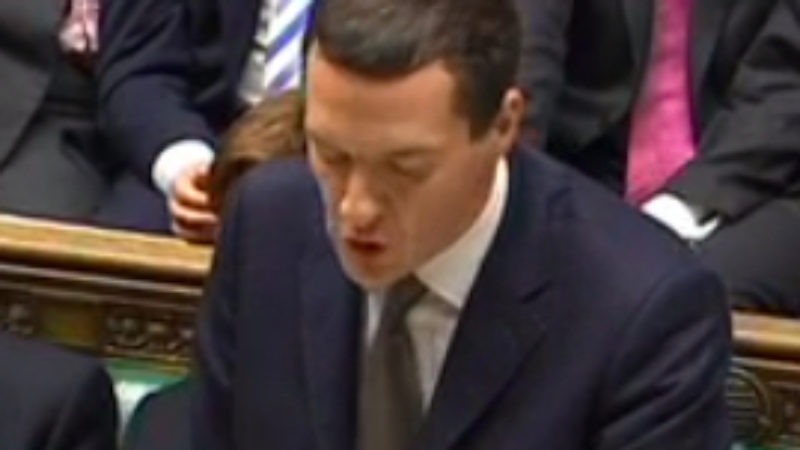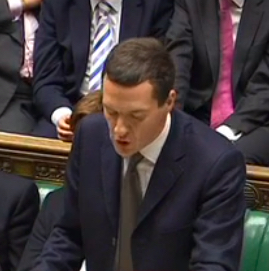
How does the budget look from the industrial estates of England? Those forgotten lands of low ugly sheds shoved to the edge of our cities and towns, next to dual carriageways but with rarely a bus-stop in sight. These places, more than the coffee shops of faux continental piazzas, are where wealth is made in late industrial Britain. The paint is peeling. Machinery isn’t being replaced. Wages are low. There are jobs, but good jobs, which you can live well on are very scarce.

Let’s assume that the story George Osborne told in his budget speech on Wednesday is true. Britain, “comeback country”, is in recovery after the longest, slowest recession since the 1930s. Employment is rising. Inflation is low. Median incomes have returned to their levels five years ago. It’s the story Ed Miliband tried to knock chunks out of on Wednesday. But is it a story to be proud of?
No, of course not. We don’t have to challenge the narrative. Over the next three months, we simply need to ask ‘is that it’? However the coalition spins and Labour criticises the statistics, the record of this government is catastrophic.
I don’t care if median incomes are at 2010 levels or £1,500 below. For the median worker not to be earning much more than when the country was mired in recession is a catastrophe. The economy is stuck in a low wage, low productivity trap, and this government has no plan to get us out of it.
Line by line, the budget was designed to take the sting out of Labour’s attacks. Ozbornomics is about short-term electoral tactics not Thatcherite ideology. You say I want to shrink the state? I’ll get it back to levels last seen under a Labour government? You say I want austerity to continue, I’ll open the public purse once I’ve reached my deficit target. You say the rich get richer? I’ll hit them hardest by copying your pension allowance cuts, blocking off some of your spending plans. You want to tax banks to pay for childcare? I’ll copy your plans but use the cash to cut the deficit.
There are countless petty battles against Ed B & Ed M that Osborne has won. As I’ve argued here before, Osborne will match us line by line and move for move (remember infrastructure? devolving power to northern cities?).
But it shouldn’t matter. Osborne is losing the real war – the struggle to raise productivity, create good jobs and give people decent housing, to rebuild Britain’s economy after the crash in other words. Since 2010, the productivity of the average worker in Britain has stayed lower than comparable industrial economies. Work pays so badly our living standards are only being kept up by another bubble of personal debt. Household borrowing is set to stand at 171% of national income by 2019 (more than the previous 2008 record of 168%). Far too few houses are being built. George Osborne’s housing plan will do nothing more than artificially inflate the prices of middle class home-owners in the south.
George Osborne’s tactics are evident from the Institute of Fiscal Studies’ analysis of the net losers and gainers from coalition tax and benefits policy since 2010. The graph goes up in the wrong place, showing that the people who’ve benefited the most are medium to high earners. Yes, the super-rich (those who don’t dodge taxes) have been hit – Osborne has been stung by Labour attacks about being friendly to the rich, and always responds. But so have the working poor and lower middle class. This is fiscal policy as an instrument in a marginal seat electoral strategy.
Let’s forget the budget, and ignore Osborne’s childish twists and turns (other than to point out that a man capable of so many U-turns shouldn’t be chancellor). Let’s repeat this time and time again: the Conservatives have no long-term economic plan, beyond giving upper income earners in marginal seats a financial incentive to put an X in the Tory box on May 7.
And my goodness, we need a plan. We need one to deal with the lack of investment in Britain’s industrial estates. We need a plan to fix our massive skills shortages. We need a plan to tackle our response to the housing crisis. The fundamentals of the British economy are in a bad way and the Conservatives have no answer.
It really is not complicated.
Productivity is low because business doesn’t have access to capital to grow, and can’t recruit workers with the right kind of skills.
Businesses on those out of town industrial estates struggle when bills aren’t paid on time. They can’t borrow money to grow. They find it impossible to recruit technically trained staff. The answer doesn’t like in tax tweaks and benefit changes, but a transformation of the structures that support businesses.
We need the network of local business banks Labour is proposing; and a radical overhaul of tertiary and vocational education. I support the cut from £9000 to £6000 fees for university students. But we should be shouting far more loudly about our ambitious plans to give every qualified school-leaver a quality apprenticeship.
The same’s true for housing. Capital to build is locked up with the big property firms that think they can make more money from speculation. We need new mechanisms to help councils and housing associations, housing coops and community land trusts invest too – and find ways to lock in assets so increases in value stay in our neighbourhood.
Let’s not allow this government a second’s credit for the ‘recovery’. If you look around our industrial estates, or the rest of working Britain, you’ll see that fundamentals of the British economy are not in a good shape. The answer is a radical overhaul of the institutions that rebuild our economy and support good jobs and houses. If we relentlessly stick to that argument, we can win the election despite Osborne’s silly tactical battles.




More from LabourList
‘The High Court judgment brings more uncertainty for the trans community’
‘There are good and bad businesses. Labour needs to be able to explain the difference’
‘This ruling should now remove any remaining barrier to approval of EHRC code’